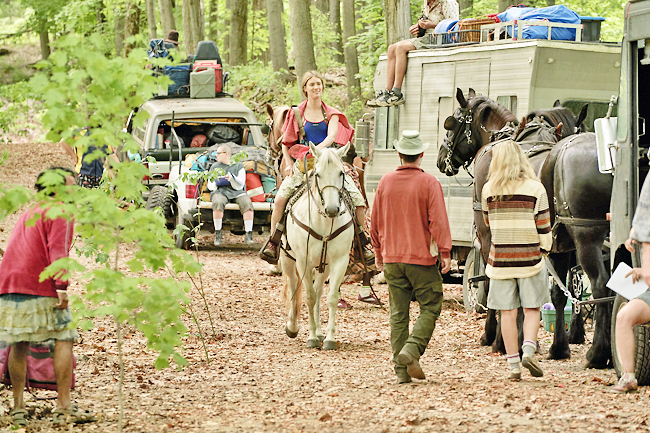Inkoo Kang
THE WASHINGTON POST – For a postapocalyptic drama premised on a flu that wipes out billions, Station Eleven is strikingly hopeful.
In much of pop culture, civilisational collapse precedes an existential descent, with characters robbed of their humanity by circumstances that force them into previously unimaginable brutality or transmutations into something else entirely, like zombies. But on the miniseries, survivors cling to what they believe make us human: Shakespeare, memory, connection, reinvention.
“Look for the helpers,” goes the oft-repeated advice from Mister Rogers in the face of bad news. “You will always find people who are helping.” That steadying optimism captures much of the spirit of Station Eleven, which begins with an eight-year-old child actor, Kirsten (Matilda Lawler), stranded and alone in the middle of a Chicago winter when the star of her King Lear production, Arthur (Gael García Bernal), dies in front of a packed house midway through a soliloquy. The first person to notice Arthur’s heart attack, Jeevan (Himesh Patel), leaps from his seat to the stage, but he’s only the brother of a doctor, not a medical professional himself. Jeevan isn’t much help to the unconscious Arthur, but he does take the opportunity to get a freezing and unchaperoned Kirsten back to her parents.
You’ve probably guessed already that Kirsten never makes it home. Her mom and dad, like most of the rest of the city, end up dead shortly thereafter. Tipped off about the flu by his physician sister, Jeevan takes Kirsten to the home of his reclusive brother Frank (Nabhaan Rizwan), along with the groceries they can transport on foot. Through Frank’s beautiful, floor-to-ceiling windows overlooking the lake, the trio see a plane nosedive nearby. The end of the world has begun.
Yes, you will get flashbacks to 2020 headlines, though seldom after the pilot; the show evokes the paranoia and confusion of last year, but quickly establishes that its precipitating calamity is on vastly larger a scale. The theatre where Arthur keels over, for instance, isn’t merely shuttered, but eventually overtaken by vines.

But don’t expect much world-building. Station Eleven operates on heart-logic, not brain-logic. Creator Patrick Somerville, an alum of the superficially similar The Leftovers, is less interested in how the survivors reconstruct what remains of society than in how they reconstitute themselves. By the end of the introductory chapter, we get a glimpse of who Kirsten – a believably precocious child both practical and idealistic – grows up to become in two decades’ time: a theatre performer (played by Mackenzie Davis) in the Travelling Symphony, an itinerant Shakespeare troupe run by the Conductor (a charmingly dotty Lori Petty). Accompanying Kirsten is the single-edition comic book she’s read all her life – also titled Station Eleven, a cherished gift from Arthur, who knew the author, Miranda (Danielle Deadwyler) – but not Jeevan or Frank.
After the pilot, the series jumps freely in time, between 2020, the year of the flu, and 2040, when a suspicious stranger attempts to join – or is that infiltrate? – the Travelling Symphony. But the drama’s real nodal point is Arthur, whose family members (Caitlin FitzGerald and Julian Obradors), friends (David Wilmot) and acquaintances nearly manage to pull through despite the flu’s survival rate of one in 1,000. In 2020, they thought they had each other figured out. After inconceivable loss, they need to find new ways of relating to one another.
Though Kirsten is the show’s de facto protagonist, its point-of-view character changes from episode to episode, allowing us greater insight into their motivations, as well as to their varying perspectives on certain events. Though it can jam up narrative momentum on a binge watch, the rotating POV characters – an approach last used so potently on the Second Wave miniseries Mrs America – is the show’s chief strength, letting us get into the characters’ heads to see how they respond to crisis, as well as what core of them remains.
With the grown Kirsten serving, when necessary, as something like a one-woman militia, Station Eleven is not without its effective, if sometimes tonally jarring, genre thrills.
But the show is mostly about how nearly every character finds a sense of purpose and learns to become a better person after catastrophe. And, personally speaking, there’s something about that vision of doomsday uplift that – while stellarly acted and cleverly against-the-grain – just doesn’t resonate with or ring true to me.
Perhaps that’s why the series doesn’t truly kick in for me until the fourth installment, when recognisable human darkness – in the form of a morally unjustifiable yet deeply familiar tribalism, armed with a willingness to enact violence in its name – encroaches upon the characters. A number of satisfying twists go into reuniting almost everyone who loved Arthur, whose imperfections become more glaring the more we view him through the eyes of those who knew him best. But in the end, Station Eleven may be too attached to its
rose-coloured glasses.






